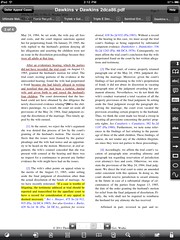iPad and Oral Advocacy
This week I had oral argument before Florida’s Fifth District Court of Appeal in Daytona, and I decided to travel light. In the past when preparing for oral argument, I would, in the course of following my own advice, put together a notebook (or two!) with marked-up copies of the cases and the most important record excerpts. Not only would I use that book to prepare, but I would carry it with me like a security blanket, as a back up in case we needed to quote from a case or from something in the record.
But this time, I had my iPad. I have come to be convinced that an iPad loaded with the GoodReader App is one of the best tools for lawyers to come around in many years. Synced with Dropbox, I have in a neat little electronic package all of the research I’ve done since I’ve purchased my iPad at my fingertips. GoodReader allows me read and annotate case law like a dream — I get all of my nice neat red underlines and yellow highlights and typed notations saved on a .pdf of the case. If I want to send the case to a colleague, I can do so with or without my annotations. And because it’s all electronic, it’s easily searchable, and I can put my hands on a library of marked up cases so much more easily than when I was trying to maintain paper research files. I can search file names through GoodReader, or search the substance of the files using either my Mac’s or my Windows box’s onboard search function.
Pre-iPad, I would have schlepped the notebook or two with me to Daytona, trying to juggle all of that paper as I reviewed and prepared and even as I approached the podium — and likely not looked at the book once I was at the podium. But this week, I had with me at the podium the briefs, my one sheet of argument notes, and my iPad, with the 6 or 7 most likely items I might want to refer to open and easily tabbed between. The screen capture to the right is a recreation/approximation of how I was ready to go for argument.
Afterward, I joked to my friends: “Instead of looking like a pack mule and not ever looking at any of it, I looked sleek and techno-savvy and never looked at it.” If I am going to have a security blanket, it is so very much easier for it to be a simple, thin electronic device rather than a huge notebook. I am sure the trees are thankful, too. And kudos to the Fifth District Court of Appeal for allowing me to carry in my electronic security blanket.
Update: Per Curiam Affirmed. For Appellee, that’s a win!

